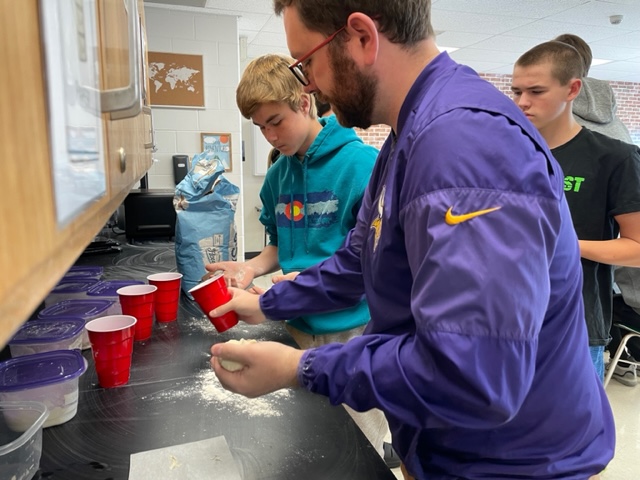Baking in Biology
Students spend the week growing sourdough starters to further investigate fermentation
Stocking helps students get their finished starters ready to bake.
November 22, 2022
On Monday Oct. 31, students in Biology classes began their sourdough starters. This hands-on project allows them to better understand the information they learned in their “Matter and Energy” unit.
The students will feed the starters by adding more flour to them and covering them with a towel, and hopefully, after 15 days, will be ready to bake. Not only is this activity helping them understand their own knowledge, but they are also helping others figure out related questions.
“Students are gathering data for the NC State Applied Ecology department,” Biology teacher Theodore Stocking said. “NC State is gathering data from across the world on sourdough starters to investigate how different strains of yeasts and bacteria interact with different types and brands of flour. The goal for our students is to gather this data and investigate the mini-ecosystem that is their sourdough starter.”
Every day, students are recording the changes in their sourdough starters. These changes include the pH, temperature, scent, and growth (in cm) of the starters. Biology teacher Mikala Hansen recognizes and appreciates the students’ attentiveness and interest for this project.
“Students are being really detailed with their data collection,” Hansen said. “They are learning the importance of having a precise technique in collecting data day after day, and starting to understand that even subtle differences in data mean something significant is happening inside their starter.”
Many of the students find this project to be really fun and interesting. While they understand the educational purpose of the starters, they just can’t wait to see the final products.
“I am looking forward to tasting the bread for sure,” freshman Kaitlyn Ferguson said. “Because we’ve dedicated so much effort to conducting this experiment, getting to taste the bread will make it all worth it. This has definitely been one of the highlights of Biology so far.”
Whether this is the students’ first time making bread or not, it is a fun way to learn how to and also some of the science behind how it works.
The sourdough project will come to an end next week. The starters will go through a 24-hour fermentation rise before getting shaped into loaves and baked. Their data from the last two weeks will also be submitted to NC state to help with further research.







